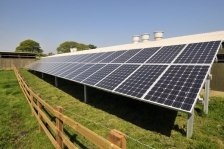
The Green Economy – which way to look in 2012
Right now, the green economy should have the world at its feet. It offers what we all need at the moment: jobs, cost and carbon saving technologies, and more convivial ways of ensuring our livelihoods. So why, then, as we look to 2012, does it seem to be on its knees? It’s not just because the economy more generally is bent low.
No, 2012 is looking bad more because of wilful and perverse political acts of national self-sabotage.
When the solar industry should be looking skyward, the government’s abrupt and capricious decision to more than halve its feed-in-tariff (FIT) has left it downcast, gazing at an emptying order book and planning redundancies.
A glimmer of Christmas hope came on 21 December when a judge ruled that the decision was flawed because it contravened rules on policy consultation.
If further symbolism were needed, the oil giant BP, which a decade ago promised its name would come to mean “beyond petroleum”, dumped its solar investments in spite of the company having made $5bn in profit during the previous quarter, and continuing to spend $20bn a year on new oil and gas. BP blamed “economic challenges”.
But the solar debacle, combined with an apparent U-turns – such as roads and planning policy, and the return of expanding aviation with a new airport in the South East – sees the green economy cast once again as a luxury, disposable in recessionary times, rather than the only foundation of future sustainability.
A chorus has re-emerged in the business press chanting that environmental policies are no longer viable. That’s a shame because, as a subset of a healthy biosphere, if the green economy is not viable, then what we’re really saying is that the economy itself is not viable. In which case, bye-bye us.
A consensus beyond those who follow, or even understand, the government’s economic approach of “expansionary fiscal contraction” (which is as funny, in a bad way, as it sounds) is that the economy’s biggest problem is a lack of demand.
This presents a challenge that progressive environmentalists feel the need to tiptoe around. They needn’t though, an apparent paradox, needn’t be a real one. Because while demand is thought to low, from another perspective, as a nation the UK still massively over-consumes against its fair and sustainable share of the world’s resources.
But this can be squared in a transitionary phase because the task of re-engineering our transport, energy and food systems and building stock for a low carbon future is a massive one. If the Green Investment Bank was allowed to issue bonds, bought by the Bank of England via a green form of quantitative easing, there could be a huge economic boost, from targeting a green new deal to create jobs, energy security and tackle climate change.
Because we would be increasing productive capacity to build a bridge to the green economy – rather than consumption for its own sake – that should quell any fears of it being inflationary.
Also, positively, in the meantime, wherever you look there is something of a cultural revolution happening in which people are abandoning the old, debt fuelled passive consumption.
Calls to re-imagine our high streets as places where we do more than just shop, but live, do things and meet people, are merging with initiatives to rebuild a more human, local financial system to support it.
Out of both choice and sometimes necessity people are making or restoring their own stuff, and producing their own entertainment, and feeling the better for it.
So, while the outlook for the green economy in 2012 might appear bleak, watch out, a new economy is growing beneath our feet. When the government decides to look down, it might consider actually supporting what works, rather than being spell-bound by zombie economics.
The Guardian
Date: 23/02/2012
Author: Andrew Simms

